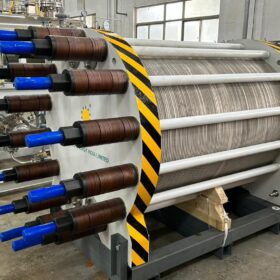International Solar Alliance (ISA) played a pivotal role at a workshop hosted by the Ministry of Energy and Hydrocarbons (MEH) in Antananarivo, the capital city of Madagascar. The workshop, themed ‘Energy Emergence through Solar Energy: Innovative Solutions for Rapid Impact Projects’, was graced by the Minister of Energy and Hydrocarbons of Madagascar, H.E. Olivier Jean-Baptiste, and key players in the energy sector. ISA’s representation, led by Dr Barakat Ahmed, Head of Programmes, Africa Region, and Mr Sudhanshu Mishra, Distribution & Solar Mini-grid Specialist, underscored the importance of the Alliance’s support in promoting a sustainable and rapid energy transition in Madagascar.
The workshop’s main aim was to explore ways of developing rapid-impact solar energy projects. The proceedings spotlighted innovative technologies and strategies, such as advanced solar panels with higher efficiency, energy storage solutions, and community-based solar microgrids. These can help reduce dependence on fossil fuels and improve access to energy for local populations and communities.
On the occasion, the Minister of Energy and Hydrocarbons of Madagascar, H.E. Olivier Jean-Baptiste, noted, “This mission and support of the International Solar Alliance to implement solar energy projects in Madagascar in the form of solar water pumping, solar cold storage, goes in line and supports the presidential initiative project in the Alaotra Mangoro region, as part of the state’s general policy under its second pillar, ‘Industrialisation and Economic Transformation.’ The implementation of these projects will contribute to the ‘One District One Factory Project’, which aims to provide at least one processing unit in each district, adapted to the existing production sectors.”
In his opening remarks, Dr Ahmed outlined the specific projects proposed by the International Solar Alliance, stating, “This year, ISA proposes implementing projects in Comoros, Madagascar, and Seychelles with financial support from Quadrilateral Security Dialogue (QUAD). These projects include installing solar cold storage units in rural areas, solarising healthcare facilities to ensure uninterrupted power supply, and implementing solar water pumping systems for agricultural use. These initiatives are designed to bring about tangible benefits, such as enhanced energy access, job creation, reliable and quality power supply, reduced dependence on fossil fuels leading to reduced carbon emissions, increased energy independence, and economic development.”
The workshop provided a platform for stakeholders to delve into the practical aspects of solar energy, particularly its application in rural and urban areas. Stakeholders and experts engaged in in-depth discussions on the challenges and solutions involved in implementing solar projects, such as the availability of financial resources, the need for specialised training to maintain and operate solar systems, and the rapid evolution of technology, which requires continuous learning and adaptation.
The workshop proceedings emphasised coordinating investments in solar energy and promoting greater cooperation between players in the energy sector, financial institutions,
and local governments. The participants also stressed the importance of training and raising awareness among the population to encourage the adoption of solar energy in every household.
About the International Solar Alliance
The International Solar Alliance is an international organisation with 119 Member and Signatory countries. It works with governments to ease solar deployment and promote solar power as a sustainable transition to a carbon-neutral future. ISA’s mission is to unlock US$ 1 trillion of investments in solar by 2030 while reducing technology and its financing costs. It promotes the use of solar energy in the agriculture, health, transport, and power generation sectors. ISA Member Countries are driving change by enacting policies and regulations, sharing best practices, agreeing on common standards, and mobilising investments. Through this work, ISA has identified, designed and tested new business models for solar projects; supported governments to make their energy legislation and policies solar-friendly through Ease of Doing Solar analytics and advisory; pooled demand for solar technology from different countries; and drove down costs; improved access to finance by reducing the risks and making the sector more attractive to private investment; increased access to solar training, data and insights for solar engineers and energy policymakers. ISA is one of the first international intergovernmental organisations headquartered in India. It is partnering with multilateral development banks (MDBs), development financial institutions (DFIs), private and public sector organisations, civil society, and other international institutions to deploy cost-effective and transformational solutions through solar energy, especially in the Least Developed Countries (LDCs) and the Small Island Developing States (SIDS). More information at https://isolaralliance.org/





